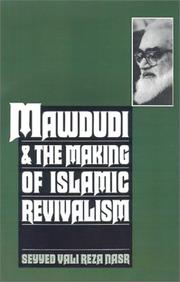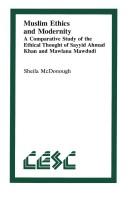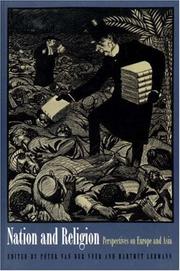| Listing 1 - 5 of 5 |
Sort by
|
Book
ISBN: 9780199361779 0199361770 Year: 2014 Publisher: Oxford Oxford University Press
Abstract | Keywords | Export | Availability | Bookmark
 Loading...
Loading...Choose an application
- Reference Manager
- EndNote
- RefWorks (Direct export to RefWorks)
"While much current research on political Islam revolves around militant Islamism, the genesis of this ideology remains little understood. A System of Life is a pioneering examination of the earliest attempt at a systematic outline of Islamist ideology, namely that proposed in the 1930s and early 1940s by the renowned Indo-Muslim intellectual Sayyid Abu'l-A'la Mawdudi. Hartung reconstructs his thought in the light of the competing ideologies at play at the time, especially his claim to recast Islam as an all-comprehensive, self-contained and inner-worldly system of life. His analysis is embedded in an understanding of the history of ideas that assumed increasingly global dimensions through colonial encounters. By showing how Mawdudi -- depicted as a major protagonist of this development - attempted to align elements of Western philosophical thought with selected traditional Islamic ideas and concepts, 'Islamism' is established as an Islamic contribution to a universalistic notion of modernity. Along with offering a detailed portrayal of Mawdudi's system of thought, Hartung also discusses the reception and modification of his ideas in the Middle East, predominantly among intellectuals of the Egyptian Muslim Brotherhood, and among their imitators in postcolonial South Asia"--
Maududi, Abul Ala --- Islam --- Philosophy --- Maudoodi, Syed Abul ʻAla, --- Islam - Philosophy --- Maudoodi, Syed Abul ʻAla, - 1903-1979

ISBN: 1280528087 0195357116 142940664X 9781429406642 9781280528088 9780195357110 9786610528080 661052808X 0195096959 9780195096958 0197740065 Year: 1996 Publisher: New York, N.Y. Oxford University Press
Abstract | Keywords | Export | Availability | Bookmark
 Loading...
Loading...Choose an application
- Reference Manager
- EndNote
- RefWorks (Direct export to RefWorks)
Nasr examines the life and thought of Mawlana Mawdudi, one of the first and most important Islamic ideological thinkers. Mawdudi was the first to develop a modern political Islamic ideology, and a plan for social action to realize his vision. The prolific writings and indefatigable efforts of Mawdudi's party, the Jamaat-i-Islami, first in India and later in Pakistan, have disseminated his ideas far and wide. His views have informed revivalism from Morocco to Malaysia. Nasr discerns the events that led Mawdudi to a revivalist perspective, and probes the structure of his thought, in order to gain fresh insights into the origins of Islamic revivalism. He argues that Islamic revivalism did not simply develop as a cultural rejection of the West, rather it was closely tied to questions of communal politics and its impact on identity formation, discourse of power in plural societies, and nationalism. Mawdudi's discourse, though aimed at the West, was motivated by Muslim-Hindu competition for power in British India.; His aim, according to Nasr, was to put forth a view of Islam whose invigorated, pristine, and uncompromising outlook would galvanize Muslims into an ideologically uniform and hence politically indivisible community. In time, this view developed a life of its own and evolved into an all-encompassing perspective on society and politics, and has been a notable force in South Asia and Muslim life and thought across the Muslim world.
Muslims --- Maudoodi, Syed Abul ʻAla, --- Syed Abul ʻAla Maudoodi, --- Maududi, Sayyid Abul Ala, --- Sayyid Abul Ala Maududi, --- Maududi, Said Abul alla, --- Said Abul alla Maududi, --- Abul Ala Maududi, Sayyid, --- Maudoodi, Sayyed Abulala, --- Sayyed Abulala Maudoodi, --- Mawdūdī, Sayyid Abūl Aʻlā, --- Sayyid Abūl Aʻlā Mawdūdī, --- Maudoodi, Abul Ala, --- Mawdūdī, Abū al-Aʻlá, --- Mawdudi, --- Mawdudi, Abul Ala, --- Syed Abdul Alla Madudi, --- Madudi, Syed Abdul Alla, --- Maudūdī, S. Abul Aʻlā --- Maududi, S. A. A., --- Maudoodi, Sayyid Abul Aʻala, --- Sayyid Abul Aʻala Maudoodi, --- Abul Aʻala Maudoodi, --- Abū al-ʻAlā al-Mawdūdī, --- Maodūdī, Māolānā, --- Maudoodi, Maulana, --- Maodūdī, Sāiẏida Ābula Āʻlā, --- Sāiẏida Ābula Āʻlā Maodūdī, --- Mevdûdî, Ebu-l-Alâ-el, --- Ebu-l-Alâ-el Mevdûdî, --- Mău̇du̇di, A. A., --- Mawduudii, Abulʼaʻlal, --- Abulʼaʻlal Mawduudii, --- Sayyid Maudūdī, --- Moudoodi, Syed, --- Syed Moudoodi, --- Maudodi, Syed Abul Aala --- ،أبو الأعلى المودودي --- ،المودودي، أبو الأعلى --- ،المودودى، سيد أبو الأعلى --- ،سيد ابوالاعلى مودودى --- ،مودودى، سيد ابو الاعلى --- ،مودودي، سيد أبو على --- مودودي، سيد ابوالأعلى، --- ،مودودي, ابو الاعلى --- مودودى، سيّد، --- Maudūdī, --- مودودى، --- Măvdudi, Săyyid Ăbulʼăla, --- Jamāʻat-i Islāmī-yi Pākistān --- Jamāʻat-e-Islāmī of Pakistan --- Jamāʻat-i Islāmī Pākistān --- جماعت اسلامئ پاکستان --- 297 --- Biography --- Islam. Mohammedanisme --- Biography. --- جماعت اسلامى پاکستان --- Maudodi, Syed Abul Aala, --- أبو الأعلى المودودي, --- المودودي، أبو الأعلى, --- المودودى، سيد أبو الأعلى, --- سيد ابوالاعلى مودودى, --- مودودى، سيد ابو الاعلى, --- مودودي، سيد أبو على, --- مودودي، سيد ابوالأعلى, --- مودودي, ابو الاعلى, --- مودودى، سيّد, --- مودودى, --- سيّد ابو الاعلى مودودى, --- Maududi, Abul Ala --- Islamic renewal. --- Maudoodi, Syed Abul �Ala, --- Jam�a�at-i Isl�am�i-yi P�akist�an. --- Jamāʻat-i Islāmī-yi Pākistān.

ISBN: 9780889207028 088920702X 0889201625 9780889201620 1282187341 9786613810250 9781282187344 6613810258 Year: 1984 Publisher: Waterloo, Ont., Canada
Abstract | Keywords | Export | Availability | Bookmark
 Loading...
Loading...Choose an application
- Reference Manager
- EndNote
- RefWorks (Direct export to RefWorks)
A study of modern Muslim ethics, focused upon the lives and writings of Sayyid Ahmad Khan and Mawlana Mawdudi, this book sheds light upon the modern ethical problems of contemporary Islam. Sayyid Ahmad Khan, often called a liberal, a modernist, or an acculturationist, represents the "liberal" trend of Sunni Muslim ethics. Khan's approach borrows much from reason, but, for Khan, reason and revelation are not in conflict. Reason guides the interpretation of Islam when revelation is insufficient. In contrast, Mawlana Mawdudi's fundamentalism is, at least in part, anti-rational; it depends upon revelation (as it comes to one man in particular) and is very autocratic. McDonough is concerned with Khan and Mawdudi, both writers within the Indo-Pakistan Muslim tradition. Their conflicting views, their differing interpretations of ethics that suit Islam in the contemporary world, exemplify the difficulties and turmoil faced by Muslims the world over. For these men, modernity has not spelled the end of Islam; yet each has found a different way of relating Islam to the present and the future in faithfulness to traditional Islam. This book will be of interest to students of contemporary Islam, as well as to those interested in questions of comparative ethics, for the liberal/fundamentalist conflicts outlined in this monograph are analogous to manifestations of the same dichotomy in all world religions.
Maudoodi, Syed Abul ʻAla, --- Aḥmad K̲h̲ān̲, Sayyid, --- Syed Abul ʻAla Maudoodi, --- Maududi, Sayyid Abul Ala, --- Sayyid Abul Ala Maududi, --- Maududi, Said Abul alla, --- Said Abul alla Maududi, --- Abul Ala Maududi, Sayyid, --- Maudoodi, Sayyed Abulala, --- Sayyed Abulala Maudoodi, --- Mawdūdī, Sayyid Abūl Aʻlā, --- Sayyid Abūl Aʻlā Mawdūdī, --- Maudoodi, Abul Ala, --- Mawdūdī, Abū al-Aʻlá, --- Mawdudi, --- Mawdudi, Abul Ala, --- Syed Abdul Alla Madudi, --- Madudi, Syed Abdul Alla, --- Maudūdī, S. Abul Aʻlā --- Maududi, S. A. A., --- Maudoodi, Sayyid Abul Aʻala, --- Sayyid Abul Aʻala Maudoodi, --- Abul Aʻala Maudoodi, --- Abū al-ʻAlā al-Mawdūdī, --- Maodūdī, Māolānā, --- Maudoodi, Maulana, --- Maodūdī, Sāiẏida Ābula Āʻlā, --- Sāiẏida Ābula Āʻlā Maodūdī, --- Mevdûdî, Ebu-l-Alâ-el, --- Ebu-l-Alâ-el Mevdûdî, --- Mău̇du̇di, A. A., --- Mawduudii, Abulʼaʻlal, --- Abulʼaʻlal Mawduudii, --- Sayyid Maudūdī, --- Moudoodi, Syed, --- Syed Moudoodi, --- Maudodi, Syed Abul Aala --- ،أبو الأعلى المودودي --- ،المودودي، أبو الأعلى --- ،المودودى، سيد أبو الأعلى --- ،سيد ابوالاعلى مودودى --- ،مودودى، سيد ابو الاعلى --- ،مودودي، سيد أبو على --- مودودي، سيد ابوالأعلى، --- ،مودودي, ابو الاعلى --- مودودى، سيّد، --- Maudūdī, --- مودودى، --- Măvdudi, Săyyid Ăbulʼăla, --- Ahmad Khan, Syed, --- Aḥmad, Sayyid, --- Ahmad, Syed, --- Ahmed Khan, Sayyed, --- Ahmed Khan, Sayyid, --- Ahmed Khan, Syed, --- Ahmed Khan, Syud, --- Ahmud, Syud, --- Alaihir Rahmah, Syed, --- Khan, Sayyid Ahmad, --- Khan, Syud Ahmed, --- Sayyid Aḥmad K̲h̲ān̲, --- Sayyid, --- Syed Ahmad Khan, --- Syud Ahmed Khan, --- احمد خان، سيد، --- احمد خاں، سيّد، --- سيّد، --- Ahamada Khām̐, Saiyada, --- Ethics. --- Maudodi, Syed Abul Aala, --- أبو الأعلى المودودي, --- المودودي، أبو الأعلى, --- المودودى، سيد أبو الأعلى, --- سيد ابوالاعلى مودودى, --- مودودى، سيد ابو الاعلى, --- مودودي، سيد أبو على, --- مودودي، سيد ابوالأعلى, --- مودودي, ابو الاعلى, --- مودودى، سيّد, --- مودودى, --- سيّد ابو الاعلى مودودى, --- Islam. --- Morale islamique. --- Islam and modern times. --- Islamic life and practice. --- comparative ethics. --- islam and modernity. --- islamic ethics. --- modern muslims. --- muslim ethics. --- muslim life. --- Islamic ethics. --- Ahmad Khan, Sayyid, --- Maudoodi, Syed Abul Ala,
Book
ISBN: 2858025670 2858025948 2858025948 2958025670 Year: 1986 Publisher: Paris Editions L'Harmattan
Abstract | Keywords | Export | Availability | Bookmark
 Loading...
Loading...Choose an application
- Reference Manager
- EndNote
- RefWorks (Direct export to RefWorks)
Islam --- Islam and politics --- Islam et politique --- Histoire --- Islamic countries --- Pays musulmans --- Politics and government --- Politique et gouvernement --- mouvements radicaux d'inspiration musulmane --- Defa'iyâ-e eslâm --- intégrisme --- Iran --- shi'isme --- 'Ali Shari'ati --- radicalisme islamique --- l'imam Sadr --- Liban --- Ibad Al-Rahmàn --- Tripoli --- disciples de la lumière --- le mouvement nourdjou --- Turquie --- Maroc --- Pakistan --- Inde --- Yougoslavie --- Mali --- la Da'wa --- néo-fondamentalisme --- Maududi --- la Jama'at-i-islami --- 'Abd al-Rahman --- wahhabisme

ISBN: 0691012334 0691012326 Year: 1999 Publisher: Princeton, N.J. : Princeton University Press,
Abstract | Keywords | Export | Availability | Bookmark
 Loading...
Loading...Choose an application
- Reference Manager
- EndNote
- RefWorks (Direct export to RefWorks)
Does modernity make religion politically irrelevant? Conventional scholarly and popular wisdom says that it does. The prevailing view assumes that the onset of western modernity--characterized by the rise of nationalism, the dominance of capitalism, and the emergence of powerful state institutions--favors secularism and relegates religion to the purely private realm. This collection of essays on nationalism and religion in Europe and Asia challenges that view. Contributors show that religion and politics are mixed together in complex and vitally important ways not just in the East, but in the West as well. The book focuses on four societies: India, Japan, Britain, and the Netherlands. It shows that religion and nationalism in these societies combined to produce such notions as the nation being chosen for a historical task (imperialism, for example), the possibility of national revival, and political leadership as a form of salvation. The volume also examines the qualities of religious discourse and practice that can be used for nationalist purposes, paying special attention to how religion can help to give meaning to sacrifice in national struggle. The book's comparative approach underscores that developments in colonizing and colonized countries, too often considered separately, are subtly interrelated. In addition to the editors, the contributors are Benedict R. Anderson, Talal Asad, Susan Bayly, Partha Chatterjee, Frans Groot, Harry Harootunian, Hugh McLeod, Barbara Metcalf, and Peter van Rooden.
Religion and state --- Nationalism --- Religion et Etat --- Nationalisme --- Comparative studies --- Religious aspects --- Etudes comparatives --- Aspect religieux --- 322 <4> --- 322 <5> --- 322 --- 322 Godsdienstige tolerantie. Godsdienstpolitiek --- Godsdienstige tolerantie. Godsdienstpolitiek --- 322 <4> Godsdienstige tolerantie. Godsdienstpolitiek--Europa --- Godsdienstige tolerantie. Godsdienstpolitiek--Europa --- State and religion --- State, The --- Consciousness, National --- Identity, National --- National consciousness --- National identity --- International relations --- Patriotism --- Political science --- Autonomy and independence movements --- Internationalism --- Political messianism --- Religious aspects&delete& --- Godsdienstige tolerantie. Godsdienstpolitiek--Azië --- Akihito, Emperor. --- Arnold, Thomas. --- Bengal: culture. --- Brahmans. --- Bunyan, John. --- Casanova, José. --- Christianity. --- Colley, Linda. --- Das, Chittaranjan. --- Disraeli, Benjamin. --- Foucault, Michel. --- Geertz, Clifford. --- Gladstone, William. --- Grant, Charles. --- Habermas, Jürgen. --- Hashim, Abdul. --- Ireland: Catholics. --- Islam. --- Jinnah, Muhammad Ali. --- Kaul, Shiv Kishan. --- Maududi, Maulana. --- Mauss, Marcel. --- Napoleon Bonaparte. --- Omura Masajiro. --- Rammohan Roy. --- Shinto. --- Sikhs. --- Tilak, Pal Gangadhar. --- Weber, Max. --- ethnology. --- fundamentalism. --- political parties. --- religion. --- Nacionalisme. --- Religió i Estat. --- Religió i Estat --- Nacionalisme --- Estudis comparatius. --- Aspectes religiosos --- Àsia. --- Europa. --- Eastern Hemisphere --- Eurasia --- Asian and Pacific Council countries --- Estat i religió --- Religió civil --- Religió i política --- Pensament polític --- Autodeterminació nacional --- Catalanisme --- Espanyolisme --- Identitat nacional --- Independentisme --- Moviments nativistes --- Nació --- Nacionalisme àrab --- Nacionalisme en la música --- Nacionalistes --- Principi de nacionalitat --- Regionalisme --- Valencianisme --- Xovinisme --- Estats i territoris --- Euràsia --- Alps --- Camí de Sant Jaume --- Corredor Mediterrani --- Danubi (Europa : Curs d'aigua) --- Europa central --- Europa de l'Est --- Europa del Nord --- Europa del Sud --- Europa occidental --- Països de la Unió Europea --- Rin (Europa : Curs d'aigua) --- Roine (Europa : Curs d'aigua) --- Tràcia (Regió històrica) --- Àsia central --- Eufrates (Àsia : Curs d'aigua) --- Eufrates (Àsia : Vall) --- Himàlaia (Àsia : Serralada) --- Jònia (Turquia i Grècia) --- Orient --- Tigris (Àsia : Curs d'aigua)
| Listing 1 - 5 of 5 |
Sort by
|

 Search
Search Feedback
Feedback About UniCat
About UniCat  Help
Help News
News